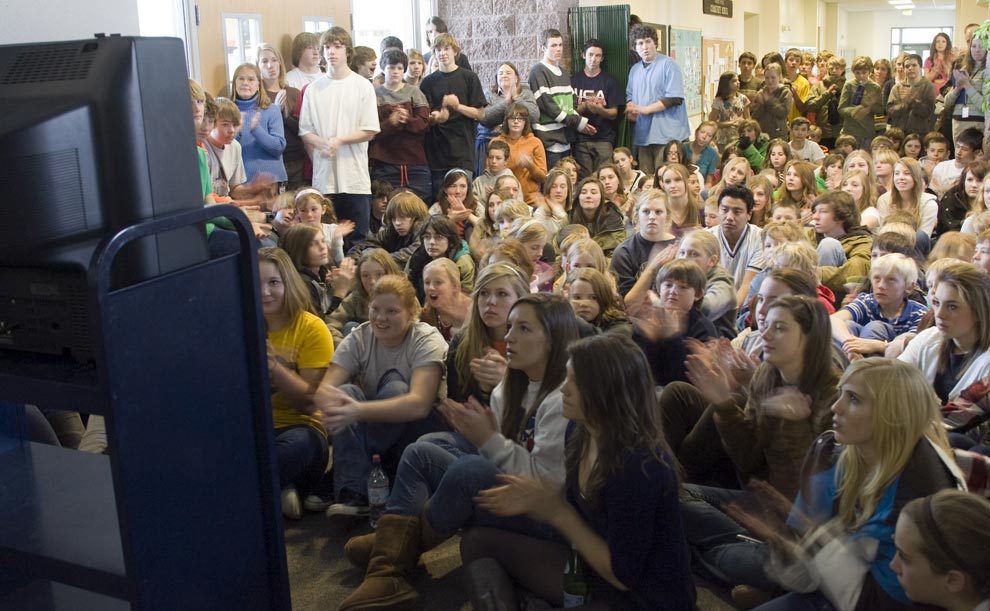I’ll be watching Barack Obama’s swearing in as our 44th president among family and friends, enjoying the sweet taste of triumph and heartfelt relief. But the Inauguration party I’d like to crash is at Clarence Thomas’ house. Maybe Ward Connerly would get an invite too, though I suspect Clarence couldn’t stand having two high-yella negroes like me and the former UC regent around to assuage his grief. Either way, Shelby Steele could bring copies of his A Bound Man: Why We Are Excited About Obama and Why He Can’t Win to pass out as party favors. I can’t help but think of Clarence, sitting with a big cigar, Rush Limbaugh on his iPod, bemoaning the state of things — that we’ve fallen so far that we could elect BARACK OBAMA, that one, that inauthentic black who has ascended to the highest office in the land through tireless effort and ambition.
Obama didn’t get a thing he didn’t earn, and shouldn’t that make Clarence happy? Isn’t that the sacred credo of the far right — that the hard work of the individual striving to better his situation is the only societal change worth having? Maybe affirmative action is only for those genuinely underqualified Supreme Court justices and sons of former presidents who have nothing better to do but drive the country into ruin.
Clarence, anyway, doesn’t seem to be taking Obama’s win well. And he couldn’t have been happy about Obama’s backhand pimp slap in a recent interview, when the Prez-elect named Thomas the Supreme Court justice he definitely would not have picked. When Clarence circulated that nuisance lawsuit about Obama’s citizenship among his fellow Supreme Court justices, he just looked petty.
How troubling it must be for Clarence and his woebegone Post-Race allies who have made careers out of their distaste for the collective achievements of the Civil Rights Movement. Their argument is that if they pulled themselves up through the dint of their hard work and rugged individualism, you should too. They sucked it up, those vicious insults and threats of high-tech lynchings, the segregation, the condescension of racist whites, and the ridicule of black folks down with the movement, because they were made of sterner stuff. These guys wanted to be thought of as agents of change confronting racism without the cloying support of the Civil Rights pimps who exploited the weak-willed for their own gain. We’re talking to you, Jesse Jackson and Al Sharpton. Through sheer effort, Post-Race men scaled the daunting wall of racism and crossed over to the promised land of racial inclusion as it manifested itself in W’s administration.
As USA Today said in 2004, “before Bush, no person of color had been named to any of the four most prestigious Cabinet jobs — at the departments of State, Treasury, Defense and Justice. Now he has named two blacks as secretary of state and a Mexican-American as attorney general.”
Those colored folk in the Bush administration got to be Post-Racial, and if we only knew how good that was, we’d all want to get there too. All one needed was to be slavishly loyal to a vicious ideology, like good old Clarence.
It’s unfair to contrast Obama, who seems to float above the stings and barbs of the lunatic right, to the ever-suffering Clarence (and what is Clarence, anyway, other than the Bizarro version of Thurgood Marshall, trying to roll back all the good Thurgood did advancing civil rights and happily bearing the cross of liberal anger?). I never heard Obama complain about being accused of treason and/or terrorist activity. Obama triumphed because he’s optimistic, opportunistic and farsighted, not to mention disciplined and rigorously analytical. His blackness informs him, as does his whiteness, as do all our backgrounds, but never did I get the impression that Obama is obsessed with race. Obviously, he is fond of black people enough to want their respect and to marry one, and he thinks that they deserve Voting Rights, as opposed to Clarence, who voted against the act’s expansion. I suppose Democracy makes Clarence nervous.
Counterpunch’s The Black Commentator sums up Clarence nicely: “The lesson Thomas drew seems to go like this: If oppression can turn you into a Supreme Court justice like me, then we need more oppression.”
With the rise of Obama, Clarence is made even more ridiculous as a scold, reveling in the wretchedness of his upbringing — shucking and jiving for the right white folks who awarded him lifetime employment and the animosity of a nation of millions. Maybe Inauguration Day will give Clarence the chance to take a look at the country and himself, and get on the change bandwagon. It’s never too late, or so I’ve heard.






 By DeWayne Wickham of
By DeWayne Wickham of 
 History will be made this coming Tuesday when, for the first time in our nation's history, con artists will invoke an African-American president as they scam unwitting patriots.
History will be made this coming Tuesday when, for the first time in our nation's history, con artists will invoke an African-American president as they scam unwitting patriots.

